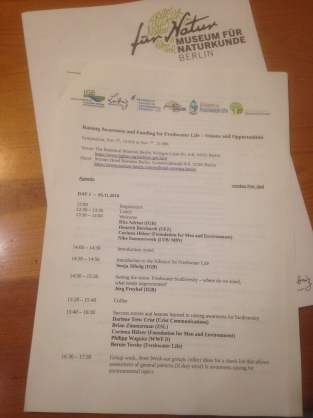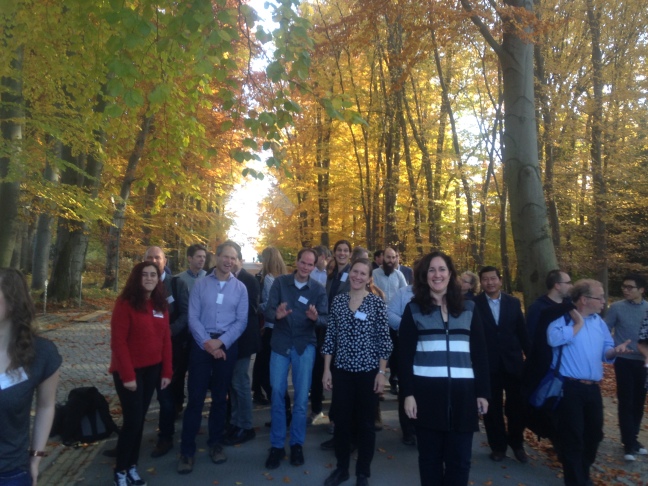About two weeks ago, after an early-morning train ride to Madrid and hasty shopping trip for a reasonable jacket (something I had considered largely unnecessary for winter in Andalucia, and about which I was only sort of wrong), I stepped out of a tidy airport into cool, Autumnal air, listening to passers-by chattering on in fluent American English and watching golden-yellow leaves drop lazily from increasingly bare trees. I could see my breath. I hadn’t returned to New England, though; I was in Berlin, and the climatic resemblance was eerie at first.
Berlin was certainly not where I had expected to spend almost a week of my Fulbright in Spain, but a string of coincidences and opportunities had me hastily booking flights only a couple weeks before. I had been invited to the second meeting of the Alliance for Freshwater Life, a brand-new initiative centered around organizing and promoting research, outreach, and conservation action in freshwater ecosystems and the species that support them.
I had heard about the organization via Twitter only months after finishing my Ph.D., and, having a strong interest in how human societies’ water management affects biodiversity, I was very keen to get involved however possible. Unfortunately, AFL was such a recent, cutting-edge initiative (their official launch was with a paper published just this past August in Aquatic Conservation) that it was still in the process of formalizing its structure, so meetings were not yet open and opportunities for participation were not yet available.
The meeting had come up repeatedly in my ongoing conversations with aquatic conservation experts and potential future research hosts. Representatives from the World Wildlife Fund, IUCN Freshwater Biodiversity Unit, and professors at universities from around Europe had all been mentioning that I “…really should find a way to get out to Berlin,” but none had the authority to get me an invite.
Later, during an already rewarding Skype conversation with a potential collaborator at the Leibniz Institute for Freshwater Ecology and Inland Fisheries (IGB), I was cheerfully informed that she was, in fact, one of the organizers for the event, and that I’d be welcome to join.

The event was held at the Berlin-Dahlem botanical garden and museum, a stunning, huge compound in an upscale and attractive neighborhood Southwest of the city. After a pleasant and efficient time navigating the city’s tidy public transportation system, I settled in a hotel room near the gardens (it was Sunday, so they were closed) and reviewed the meeting’s program.
The primary emphasis of the meeting was on determining organizational structure and investigating options for raising awareness and financial support for protecting freshwater species. While I will leave a more in-depth account of the importance of freshwater life for a later blog post, it will suffice here to say that freshwater biodiversity, despite contributing disproportionately to human well-being and water security, is also being lost at rates far exceeding terrestrial or marine systems. The urgency and broad importance of the freshwater biodiversity crisis are two of many factors that draw me to this fascinating line of work in conservation.
Although the meeting plan was exciting enough, I was more struck by the list of participants. Featuring founders of water conservation non-profits, expert fish biologists, water conservation experts, communications gurus, and top scientists from international conservation groups, it was an intimidating who’s-who of the top professionals working across the field of freshwater biodiversity conservation.

The following few days were a whirlwind of informative talks, inspiring conversations, insightful brainstorming, and a caliber of professional networking I have never before experienced. Between all the workshop sessions, roundtables, and presentations, I enjoyed coffee break dialogues between brilliant and talented minds thinking creatively and seriously about conservation issues of global importance. It was an invigorating and refreshing environment. I introduced myself to dozens of professionals who were working in the types of positions where I would love to see myself in a few years, and got invaluable career advice, guidance, and contacts. I felt like an over-filled sponge every evening, and spent hours scribbling frantically in my notebook to record as much as possible of the multifarious knowledge in which I was being steeped.
As the meeting moved on into planning stages and breakout groups, I had the opportunity to participate, sharing my views and helping organize, highlight, or modify the contributions of others. I even ended up presenting one focus groups’ results to the rest of the meeting attendants.

As the meeting drew to a close, we gathered for a photograph outside, and had a tour of the grounds of the botanical garden. Although the sun was setting at this point, I managed to snap a few photos outside and one of their impressive greenhouses (of course, they took us through the aquatic plants section first!).

After a final morning discussing future directions and delegating important tasks, we said our varied goodbyes and dispersed again. I returned to Sevilla with my head absolutely buzzing with new ideas, questions, and most importantly aspirations. I would resume my work in Spain armed with new knowledge and context as to the larger importance of my work there and its relevance to global conservation issues. ¡Adelante!



